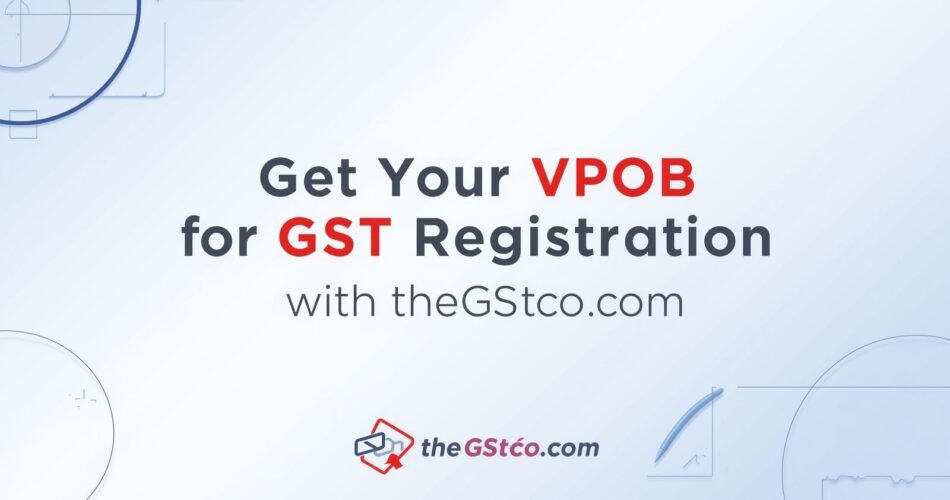Registering your business under the Goods and Services Tax (GST) is one of the first and most important steps toward making it legally recognized. However, many business owners face delays or rejections because of small but avoidable mistakes in their applications. With the increasing use of VPOB for GST registration, it has become essential to understand the process clearly and ensure accuracy in every step.
A VPOB acts as an official business address for companies that do not operate from a physical office. It is especially beneficial for startups, freelancers, and e-commerce sellers who work remotely or manage online stores. While it simplifies registration, even minor errors can cause unnecessary trouble. Let’s look at the most common mistakes applicants make and how to avoid them.
Incorrect or Incomplete Details
A frequent reason for GST registration rejection is providing incorrect or incomplete information. Applicants often make spelling mistakes in their business name, enter wrong PAN details, or forget to update their contact information. Since the GST system verifies all data with the Income Tax records, even a small mismatch can lead to verification failure.
When applying with a VPOB for GST registration, ensure that all details on your documents—such as rent agreement, NOC, and electricity bill—match the information entered in the GST application. Inconsistencies between documents and your online form can cause immediate rejection.
Using an Unverified or Invalid Address
Another common error is registering your business with an address that is not legally compliant. GST authorities require a verifiable and valid business address supported by legal documents. When using a VPOB, your provider must supply legitimate proof such as a registered rent agreement, a current utility bill, and an NOC from the property owner.
Choosing an unreliable provider or using a fake or reused address can create serious issues later, including cancellation of your registration. Always select a trusted VPOB provider who offers government-approved and verifiable addresses in compliance with GST regulations.
Submitting Blurry or Incomplete Documents
A large number of applications are delayed or rejected because of unclear document uploads. If your rent agreement, PAN, or Aadhaar copies are not properly scanned or are partially visible, the GST officer may reject your submission.
To avoid this, use high-quality scans of all documents. Professional VPOB service providers usually supply digital copies that are already formatted and ready for upload, ensuring your documents are clear and complete.
Choosing the Wrong Business Category
Many applicants mistakenly select the wrong business structure when filling out their GST application. For example, a sole proprietor might register as a company, or an e-commerce seller might skip selecting “online sales” as a business activity. These mistakes can cause confusion during return filing or audits.
Before registering, understand your business structure clearly. If you are unsure, consult your VPOB provider or a GST expert to choose the correct category. Correct classification from the start helps avoid future complications.
Not Listing All Business Locations
GST law requires that you mention your main business address and any additional business locations. Many sellers forget to include warehouses or fulfillment centers, especially when they sell through platforms like Amazon, Flipkart, or Meesho.
If your business operates in multiple states, you must apply for separate GST registrations in each state. Having a VPOB in every state makes this easier and more affordable since you don’t need to rent physical offices everywhere.
Missing the Authorization Letter
One of the commonly ignored requirements during registration is the authorization letter. This document confirms that the applicant has the authority to file the registration on behalf of the business. Many applications remain pending because the authorization letter is missing or not formatted properly.
When registering with a VPOB for GST, your provider usually includes a valid authorization letter with other required documents. Make sure your name, role, and signature are clearly visible before uploading it to the portal.
Ignoring Department Queries
After submission, the GST department may raise questions or request additional information. Some applicants miss these updates because they don’t check their email or the GST portal regularly. Not responding on time leads to automatic rejection.
Always monitor your application status closely. Reliable VPOB providers often assist clients in handling such queries quickly, ensuring your registration moves forward without unnecessary delay.
Selecting an Unreliable VPOB Provider
The biggest mistake new businesses make is choosing a low-cost or unverified virtual office provider. Some use blacklisted or previously registered addresses, which can create compliance problems later. If the address is flagged by GST authorities, your registration could be suspended.
It’s safer to choose a reputed and verified VPOB provider who offers legally valid documents such as rent agreements, NOCs, and electricity bills. This ensures your address is authentic and compliant with GST laws.
Failing to Maintain Documents After Registration
Many business owners stop keeping track of their registration documents once they receive their GST certificate. However, these documents are essential for future audits or inspections. The GST department can request proof of your registered address or rent agreement anytime.
Keep all documents related to your VPOB for GST registration—including rent agreement, NOC, utility bill, and authorization letter—stored safely in both digital and printed form. Proper record-keeping ensures long-term compliance.
Conclusion
Most GST registration issues occur due to simple errors that can easily be avoided. Paying attention to detail, submitting clear documents, and using a verified address are key to getting your registration approved quickly.
A VPOB for GST registration is an excellent solution for businesses that don’t have a physical office but still need a legitimate GST-registered address. It helps you stay compliant, reduces overhead costs, and simplifies your registration process.
Choosing the right provider and avoiding common mistakes can make your GST journey smooth and stress-free. With proper preparation and accurate documentation, your business can obtain GST approval without delays and operate confidently under full compliance.
